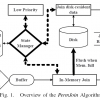383 search results - page 7 / 77 » Join operations in temporal databases |
200
click to vote
VLDB
2004
ACM
16 years 2 months ago
2004
ACM
Ranking queries produce results that are ordered on some computed score. Typically, these queries involve joins, where users are usually interested only in the top-k join results....
131
Voted
ICDE
2011
IEEE
14 years 5 months ago
2011
IEEE
— Uncertain data is quite common nowadays in a variety of modern database applications. At the same time, the join operation is one of the most important but expensive operations...
246
Voted
ICDE
2008
IEEE
17 years 1 months ago
2008
IEEE
This paper introduces an efficient algorithm for Producing Early Results in Multi-join query plans (PermJoin, for short). While most previous research focuses only on the
case of ...
115
click to vote
SIGMOD
2003
ACM
16 years 2 months ago
2003
ACM
Object-oriented and object-relational DBMS support setvalued attributes, which are a natural and concise way to model complex information. However, there has been limited research...
109
Voted
DEBS
2007
ACM
15 years 5 months ago
2007
ACM
Queries for composite events typically involve the four complementary dimensions of event data, event composition, relationships between events (esp. temporal and causal), and acc...



